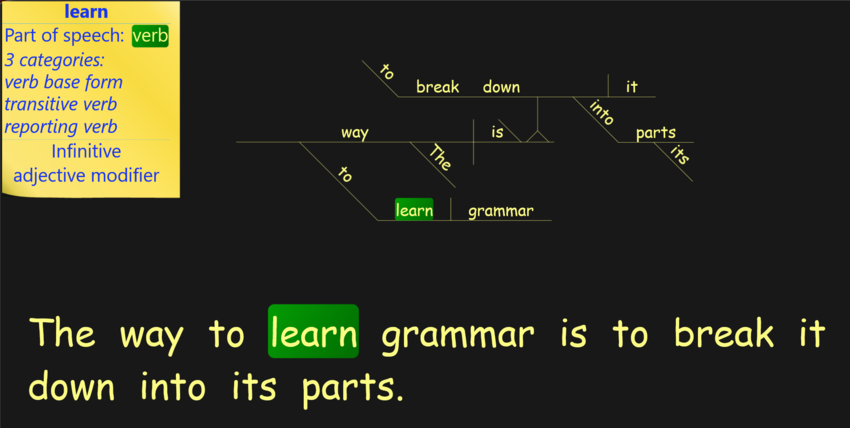Infinitives as nouns, adjectives and adverbs (grammar)

Infinitives are the "to" form a verb, such as "to do" or "to play". The "to" is called a particle, and it serves to show a verb in the infinitive form.
Here's the thing: the infinitive is a verb, but it is not an action verb (known as a "finite" verb). However, it still maintains a "sense" or implication of its verb.
Try to think of infinitives, adjective participles and gerunds as "verby." Even if the verb form is acting as another part of speech, it retains its verb-origin quality of action or state of being.
We see this use of verbs in "gerunds" and "participle adjectives", which are easier to conceptualize than infinitives. For example,
Present participle adjectives:
- -ing form of the verb (participle)
- such as "working" when used to describe something
- ex. the working class deserves a holiday
- such as "working" when used to describe something
- - testing present participle adjectives:
- - since modifiers are not essential elements to a sentence, if you can remove the participle and the sentence still works, it's a participle adjective.
Past participle adjectives:
- -ed form of the verb (participle)
- - or the past participle form of an irregular verb, such as "began"
- - testing present participle adjectives:
- - since modifiers are not essential elements to a sentence, if you can remove the participle and the sentence still works, it's a participle adjective.
Present nouns = gerunds:
- -ing form of the verb (participle)
- testing gerunds:
- nouns as subjects are necessary elements to a sentence, So if you cannot remove the gerund and the sentence does not work, it's a gerund.
- nouns as objects are necessary elements to transitive verbs (verbs that require an object) and prepositions (which require an object), if you can remove the gerund and the sentence does not work, it is a gerund.
Testing participles/ gerunds:
- The conference opened at 2:00
- The conference
openedat 2:00- sentence doesn't work, so participle = action ("finite") verb
- The opening conference was fascinating
- The
openingconference was fascinating- sentence still works, so participle = present participle adjective
- The opening of the conference was fascinating
- The
openingof the conference was fascinating- sentence does not work since it removes the subject, so participle = gerund
- (note: "of the conference" is a prepositional phrase, which cannot be a subject)
- sentence does not work since it removes the subject, so participle = gerund
Identifying participial phrases is more complicated, but the same principle works: if the phrase can be removed and the sentence still works, it's a participle adjective.
Now, for infinitives!
Like gerunds and present/past participle adjectives, infinities are non-finite verbs, thus they do not directly indicate action or state. Infinitives, then, can act as a noun, adjective, or adverb modifier.
Ex.:
- To go to that theatre is fun << infinitive as subject/noun
- That theatre is the place to go << infinitive as adjective (describes "place")
- I set my alarm to ring at 5:00 << infinitive as adverb (qualifies the verb "set")
Let's look at infinitives now as nouns, adjectives and adverbs.
It's an infinitive acting as a noun:
- She hates to wait
- subject verb noun (direct object)
But then it gets complicated. Sometimes the infinitive has its own preposition or object. Prepositions are fine, as if the infinitive is a noun it can be modified by a prepositional phrase.
Ex.:
- I finished in time to go to the store
- to the store is a prepositional phrase that modifies the infinitive to go
- btw, in time = prepositional phrase that modifies the verb finished
- to the store is a prepositional phrase that modifies the infinitive to go
Here the infinitive has its own object:
- He relentlessly attacked the backhand to humiliate his opponent
- his opponent is the object recipient of the infinitive to humiliate
- whereas the backhand is the object of the verb attacked
- in this sense, the infinitive to humiliate retains the essence of a verb or action, thus it takes an object
- however, it is still not a specific action, thus it is a "non-finite verb"
We use infinitives all the time in order to indicate a sense of an action, only without stating the action as happening.
Way to go!